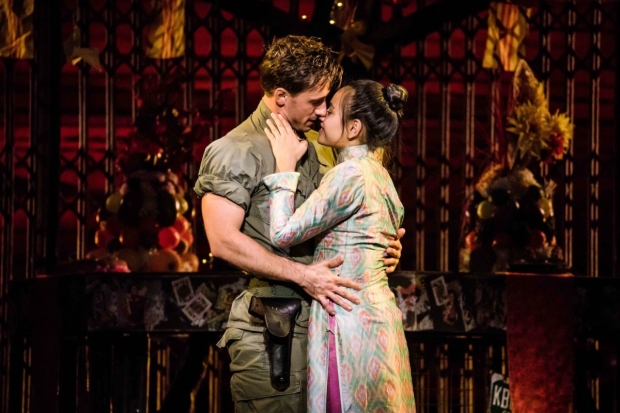This Miss Saigon Offers Full Spectacle and Romance
The national tour makes a stop at the Cadillac Palace Theatre.

(© Matthew Murphy)
The American cultural memory of the Vietnam War is a complicated one. Unpopular even at its onset, the war has become pop-culture shorthand for American guilt. Countless narratives set during that conflict focus on the emotional turmoil of the US soldiers, rarely considering the inner lives of the people of Vietnam. Miss Saigon, whose national tour is currently at the Cadillac Palace Theatre, is, in many ways, a European examination of America's relationship with the Vietnam War.
Produced by Cameron Mackintosh, the 1989 pop opera is a resetting of Giacomo Puccini's 1904 opera Madama Butterfly, in which a Japanese woman is seduced and abandoned by an American naval officer. French composer Claude-Michel Schönberg and lyricists Alain Boublil and Richard Maltby Jr. transposed Puccini's tragic tale to the fall of Saigon and its aftermath, creating a parallel between America's perceived abandonment of Vietnam and young American marine Chris's abandonment of his Vietnamese bride, Kim.
The cast is led by Emily Bautista as Kim, a newly orphaned teenager who turns to prostitution to survive. Though the character is troublingly devoid of agency (she speaks barely 20 words before Chris lobs his first ballad at her), Bautista's Kim is no wilting flower. Her soaring voice is matched with a decisive, almost aggressive, physicality. As a result, Kim's enduring love for Chris feels more rooted in pride and defiance than single-minded devotion, a more palatable choice for modern audiences. Bautista shares electric physical chemistry with Anthony Festa, who brings a bright voice and agonizing self-doubt to the role of Chris. As love stories go, Chris and Kim's is pretty flimsy, but when Festa and Bautista stare into one another's eyes and sing, you buy it.
As the exploitative grifter who calls himself the Engineer, Red Concepción is perfectly sleazy. He oozes energy, which comes to a climax in his Act 2 showstopper "The American Dream," where he pulls dollar bills and cigars out of the air like a crass, two-bit Vegas magician. The supporting cast does a capable job, particularly Christine Bunuan as Saigon prostitute Gigi, who sings "The Movie in My Mind" with a haunting melancholy.
The grand scale of the Broadway revival, directed by Laurence Connor, has been cut down only slightly for the road. The iconic helicopter still arrives on cue, along with the rest of the spectacle showpieces expected of this mega-musical. Conductor Will Curry leads a 12-piece orchestra, which accompanies the multitude of saxophone-infused power ballads in Schönberg's score. Lighting designer Bruno Poet and sound designer Mick Potter create a hazy, disorienting war-zone atmosphere, supplemented in key moments by Luke Halls's projection design. An enormous golden bust of Ho Chi Minh is wheeled onstage to oversee the pageantry of "The Morning of the Dragon," a massive ensemble number signaling the strength of the new Vietnamese regime. Unfortunately, the ensemble lacks the military precision needed to sell the aesthetic, and the sequence falls flat.
The music of Miss Saigon is terribly dated, firmly rooted in its Euro-pop heyday. But this modern production has somewhat evolved politically. A whitewashed cast in yellowface is nowhere to be seen, and by emphasizing Kim's steely resolve, the show's much-criticized White Savior narrative is softened — though it still has a ways to go. First and foremost, however, Miss Saigon promises oversize spectacle and epic, sweeping emotions — and on that front, it delivers.








